Annual Report 2022
Informes anuales
Introduction
The Access to Public Information Unit (hereinafter UAIP, for its acronym in Spanish), is the control body created by the Law on Access to Public Information No. 18.381 of October 17, 2008 (hereinafter “LAIP”, for its acronym in Spanish), to ensure compliance with the obligations it imposes on public institutions.
Pursuant to the duties outlined in Section 21 of the aforementioned Law, it is required to prepare and submit to the Executive Branch an annual report on the status of this right. This report is made in June (information processed as of June 12, 2023), at the end of the term established by Section 7 of the LAIP for regulated parties to submit their annual compliance report.
The Executive Committee of the Unit has undergone some changes this year: in September, Dr. Gabriel Delpiazzo terminated his duties, and Dra. Mariella Saettone assumed his place as a new member of the Executive Committee. Since then, the Presidency has been held by Mag. Alejandra Villar Anllul.
Throughout this report, the UAIP disseminates and accounts for everything done during the year 2022.
Main activities carried out.
The activities carried out in 2022 are described and detailed below.
Awareness-raising and training activities
Different training sessions and discussions were held on topics ranging from the right of access to public information to document management.
Of relevance are the training sessions for the General Accounting Office of the Nation and a workshop for members of Plan Ibirapitá. (access the article).
On the other hand, a series of courses were held at the National School of Public Administration (ENAP - ONSC) on access to public information, transparency, and document management as an instrument to support the exercise of the right to information.
This consisted of three sessions held in April, August, and December.

Number of people who attended the training sessions: in 2019: 858 people; in 2020: 200 people; in 2021: 627 people; and in 2022: 353 people.
Oversight and Control
At the beginning of 2022, the Unit worked to release what would be the milestone of the year for the Unit: The National Index of Transparency and Access to Information (hereinafter INTAI, for its acronym in Spanish). INTAI is and will be for the years to come, the flagship of UAIP and the tool for public institutions, both state and non-state, to continue on the path of transparency and access to public information.
The results of this first edition, as well as all related information, are available on the Unit's website. (access INTAI information).
Contribution to the Culture of Open Government
The UAIP worked actively in preparing the 5th National Action Plan 2021-2024, thus ratifying the role assumed by the country to promote the values of open government as transversal principles in public management.
Uruguay assumed 29 commitments from 23 state institutions. The UAIP committed to strengthening oversight and accountability of compliance with the Law on Access to Public Information, which will begin to be implemented next year.
It also shares responsibility with other agencies in the commitments related to the creation of an Observatory for the use of Artificial Intelligence in the State and the Accessibility of information and digital services of the State, under which several activities were carried out.
International Relations
At the international level, as part of the RTA Board of Directors, members of the Unit's Executive Committee attended the General Assembly in Panama City.
In addition, we initiated the SUR-SUR Project, signed by the Colombian and Uruguayan states, to work on gender and access to public information.
As usual, a network campaign was carried out to celebrate September 28th, Access to Public Information Day. (access the article).
Series of Transparent Dialogues
In order to continue interacting with people, academia, and civil societies and to continue to disseminate the right of access to public information, the second edition of "Transparent Dialogues" was held with the central theme "Access, Transparency, and groups in vulnerable situations". (access the article).
Within this framework, two talks were held on "Disability and access. Barriers to break down" and "Gender: inclusion and transparency" with national and international experts and space for questions and exchange.
X International Seminar
The topic selected for this year was "Monitoring, oversight, and archives for the transparency of the State".
It was held in person and was broadcasted on the YouTube channel of the Agency for the Development of Electronic Management Government and Information and Knowledge Society (Agesic, for its acronym in Spanish).
It gathered national and international speakers and provided space for debate. (access the article).
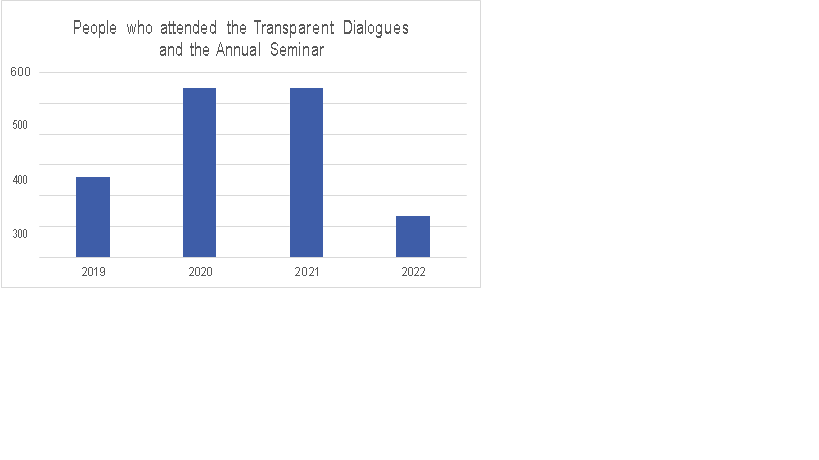
Number of people who attended Transparent Dialogues and Annual Seminar: in 2019: 262 people; in 2020: 550 people; in 2021: 550 people; and in 2022: 134 people. and in 2022: 134 people.
Municipal Transparency Pilot
In the year 2022, the pilot of the Municipal Transparency Project was closed, and the consultants received the Municipal Transparency Management Model. (access the article).
Throughout the year, follow-up was carried out with the municipalities participating in this pilot program, particularly those in the Department of Canelones, and two meetings were held with government employees and one with municipal authorities.
The participation of the municipalities of the Departments of Canelones, Cerro Largo, and Rivera is greatly appreciated,
Institutional strengthening
As part of its relationship with the academia, the UAIP joined a working group on information policies, document management, transparency, and access to information in Uruguay of the School of Information and Communication; and within this framework, we participated in the Research Conferences of said university service.
It is worth mentioning the cooperation agreement with the National Internal Audit Office, to carry out joint actions aimed at fulfilling the mission of both institutions concerning transparency in the State, and as a way of optimizing results and efficient use of state resources. (access the article).
Management indicators 2022
At the same time, the advisory and management tasks continued to be developed in order to move forward in the consolidation of a culture of transparency in the public administration, as well as to guarantee the effective exercise of the right of access to public information in our country.
Data of the 2022 management are provided below:
- Management indicators 2022
| ITEM | Quantity |
| Queries processed | 24 |
| Item | Quantity |
| Booking reports processed | 35 |
| Complaints processed | 100 |
| Legal reports completed | 141 |
| Meetings with institutions to provide advice and answer queries | 10 |
| Calls answered | 239 |
| Emails answered | 784 |
| Face-to-face assistance | 3 |
| Executive Committee Meetings | 34 |
| Resolutions | 91 |
The evolution of some of these items is illustrated:
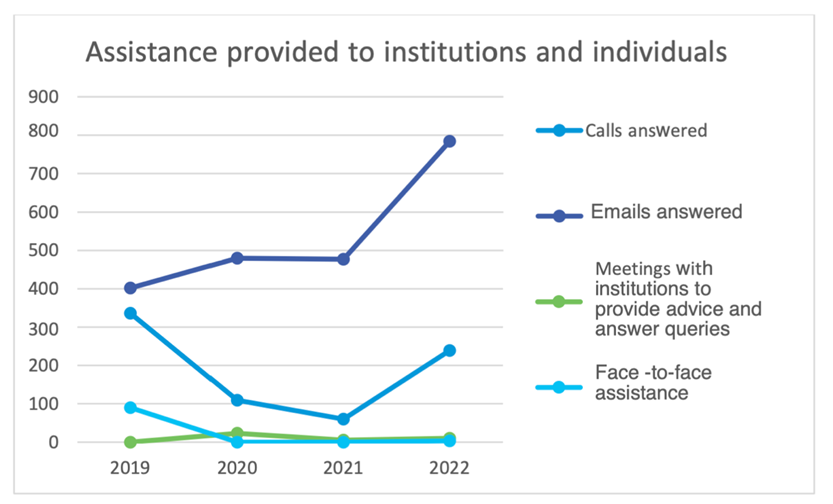
Items of assistance to institutions and individuals. Calls answered: in 2019: 336 calls; in 2020: 109 calls; in 2021: 60 calls; and in 2022: 239 calls. Emails answered: in 2019: 402 emails; in 2020: 480 emails; in 2021: 477 emails and in 2022: 784 emails. Meetings with institutions: in 2019: no data; in 2020: 23 meetings; in 2021: 5 meetings and in 2022: 10 meetings. Face-to-face assistance: in 2019: 90 visits; in 2020: no data; in 2021: no data; in 2021: no data; and in 2022: 3 visits.
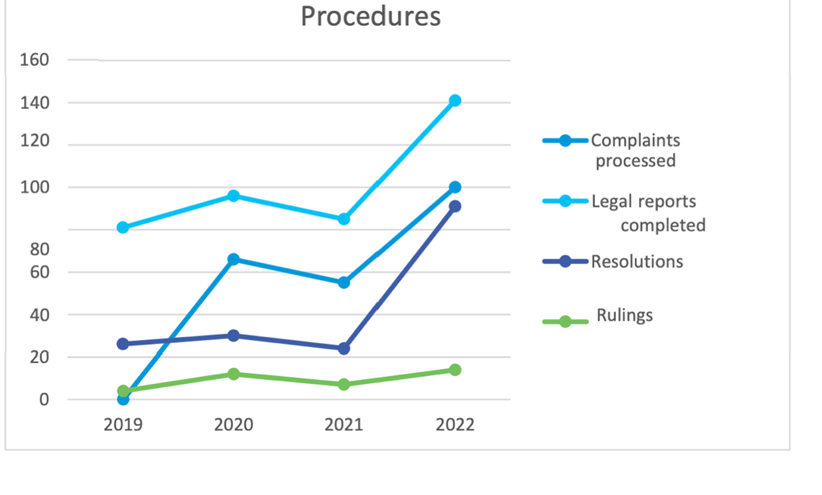
Number of procedures. Complaints processed: in 2019: no data; in 2020: 66 complaints; in 2021: 55 complaints; and in 2022: 100 complaints. Legal reports: in 2019: 81 reports; in 2020: 96 reports; in 2021: 85 reports; and in 2022: 141 reports. Resolutions: in 2019: 26 resolutions; in 2020: 30 resolutions; in 2021: 24 resolutions and in 2022: 91 resolutions. Rulings: in 2019: 4 rulings; in 2020: 12 rulings; in 2021: 7 rulings and in 2022: 14 rulings.
Control indicators 2022
The last business day of March of each year is the deadline to submit the annual report on the status of compliance with the obligations of access to public information that the Law imposes on the regulated parties.
A summary of the information obtained regarding such compliance is presented below.
Clarification: The information corresponds to the data sent by the regulated parties through the submission of the aforementioned reports.
In the year 2022, 127 regulated parties submitted the report.
A total of 8,000 requests for information were processed, of which 7,500 were answered:
2. Requests received.
| Processing of requests received | |
| Requests answered | 7500 |
| Unanswered expired requests | 102 |
| Rejected requests | 398 |
| Overall total | 8000 |
Most of the requests answered provided full access to the information requested, while a smaller proportion had multiple responses and only 757 were rejected:
3. Type of response
| Type of response | |
| Total number of requests in which total access was granted | 6436 |
| Total requests rejected | 757 |
| Total requests with multiple responses | 307 |
| Overall total | 7500 |
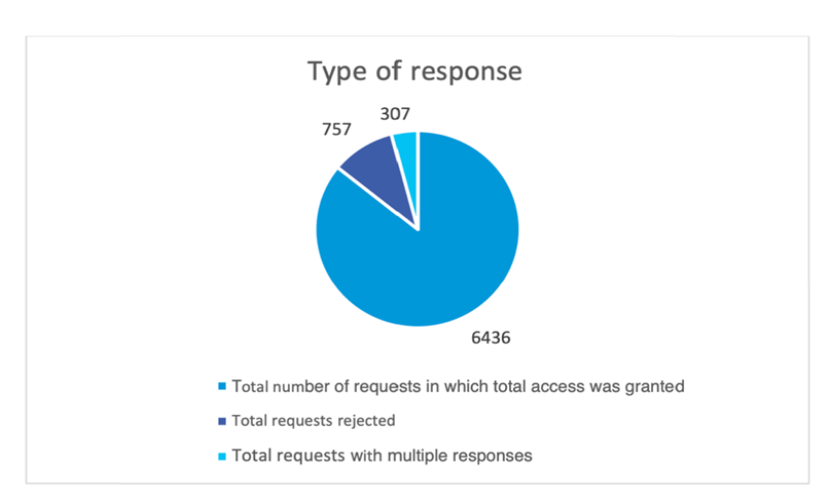
Number of responses to access requests, according to the type of response (total access: 6436 requests, rejected: 757 requests, multiple responses: 307 requests).
In terms of response time, most requests were answered within 20 days:
- Response time
| Response time | |
| Requests answered within the deadline | 6005 |
| Requests answered within the extension period | 883 |
| Requests answered after the deadline | 612 |
| Overall total | 7500 |
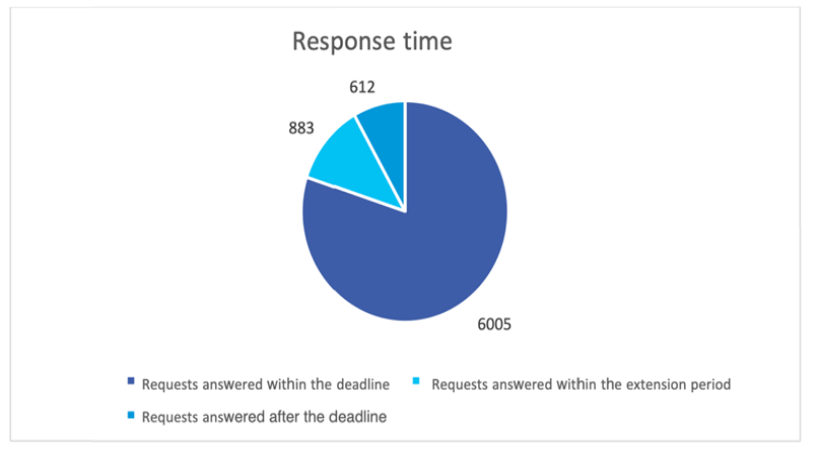
Number of responses given to access requests, according to response time: on time: 6005 requests, within the extended period: 883 requests, and after the deadline: 612 requests.
Regarding the reasons for rejection, the vast majority were due to the non-existence of information:
5. Reasons for rejection
| Reasons for rejection | |
| Confidentiality | 52 |
| Secrecy | 25 |
| Privacy | 57 |
| Nonexistence | 623 |
| Overall total | 757 |
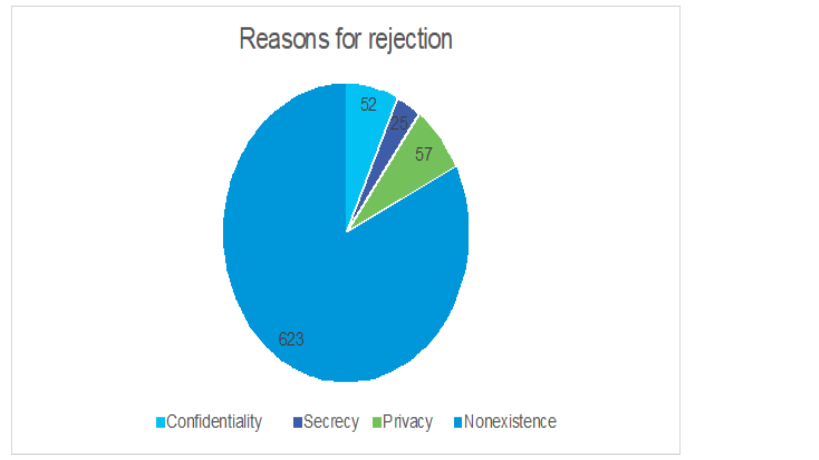
Number of rejections given to access requests, by reason: confidentiality: 623 rejections; secrecy: 25 rejections; privacy: 57 rejections; and nonexistence: 52 rejections.
